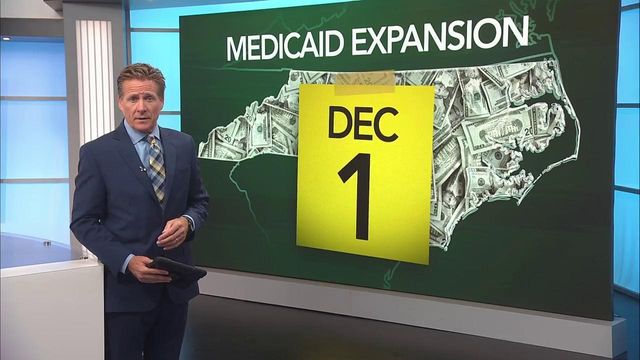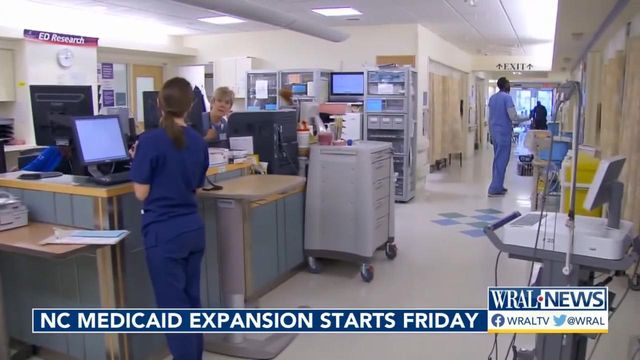After 14 years, billions to flow as 600,000 qualify for Medicaid insurance in NC
Almost 600,000 North Carolinians will become eligible for health insurance Friday as the state becomes the 40th state in the country to expand Medicaid.
About 300,000 of them will be instantly enrolled and another 275,000-plus eligible residents would have to go through an enrollment process over the coming months in the nearly 14-year-old federal program that insures the working poor with funding from U.S. taxpayers.
The plan, a legacy of 2010’s federal Affordable Care Act, will mean billions of dollars — annually — for state hospitals and doctors as more people are enrolled in the government insurance program. That means more people getting routine checkups and seeking earlier intervention for health issues.
That, policy makers hope, will keep people out of the emergency room and cut costs for hospitals, particularly in rural areas — and make for a healthier, more productive population.
The deal also includes a major funding boost for mental health care, and there’s up-front money – roughly $2.6 billion statewide – to help hospitals get started.
But the bottom line for struggling families is that a nearly free health insurance program once reserved largely for children and badly disabled adults will now also serve North Carolina adults living near poverty.
Single adults qualify if they make $20,120 or less a year. For a family of four, the cutoff is $41,400.
“It’s a sense of relief and joy, what we hear from folks over and over again,” Kody Kinsley, the secretary of the state Department of Health and Human Services Secretary, told WRAL News. “This is about moms and dads who want to try to stay healthy and keep working so they can take care of their kids. They're going to be able to see a provider and have that wellness checkup to stay healthy.”
Medicaid already has about 2.8 million enrollees statewide, a figure that ballooned during the pandemic. About half are children, many of the others are permanently disabled.
Close to 300,000 people coming onto the rolls should have their new state-issued health insurance cards in hand because they were already part of a slimmed-down version of Medicaid that covers only reproductive health and the programs have similar qualification thresholds.
“We were able to run our algorithms on them and get them enrolled,” said Jay Ludlam, the state health department’s deputy secretary for Medicaid. “And they should be ready to go.”
Others will need to apply, which state and county officials hope people will do online through the ePass program. County social services departments are anticipating lines as people come to apply in person. They also expect backups likely to push application review times beyond the state’s 45-day goal.
“The only thing I can ask … is patience,” said Brenda Reid Jackson, Cumberland County’s DSS director.
Reid Jackson said she expects an extra 3,200 applications a month to review. She said she’s particularly hopeful that people who are homeless will apply, as well as people who are borderline disabled — those able to work but struggling to hold a full-time job.
She listed uncontrolled diabetes as an example. “It’s not uncontrollable all the time,” she said, but when it flares up it’s difficult to keep an hourly job.
State and county officials are pushing enrollment. Reid Jackson said case workers are visiting homeless shelters. The state has taken a lesson from the COVID-19 pandemic, when it struck deals with community organizations to build trust and push out information, renewing many of those relationships.
Some of this work targets communities where English is not the primary language. Some of it targets rural areas where people are less likely to have health coverage and more likely to qualify for expansion.
“What we discovered during the pandemic is, as much as we reach out to our communities, we can't say it enough, right?” said Debra Farrington, the state’s chief health equity officer. “We just want to repeat ourselves so much that most folks will know what's happening.”
This effort has largely been funded by philanthropic donations, Farrington said, though the state plans to spend millions in the coming year to advertise expansion.
Big money sealed deal
For more than a decade, Republicans lawmakers in control at the General Assembly blocked expansion, which was a top priority for Gov. Roy Cooper and other North Carolina Democrats ever since the federal government created the program in 2010.
As expansion, and the Affordable Care Act that created it, survived legal challenges and Republican congressional efforts to repeal it, and as Medicaid expanded in a majority of other states, that opposition eroded.
Support grew in rural areas with struggling hospitals threatening to close.
Then a Democratic-controlled Congress, as part of pandemic-era spending legislation, sweetened the deal, offering one-time payments to holdout states that chose to expand. That will put an extra $1.8 billion in North Carolina’s state budget over the next two years, largely no-strings attached.
President Joe Biden's re-election campaign celebrated North Carolina's expansion milestone this week and used it to remind people that former President Donald Trump – the Republican front runner in next year's presidential election – could reignite efforts to repeal the Affordable Care Act, and expansion with it.
Democrats see the issue as a potent one heading into the 2024 elections, and North Carolina will be an important swing state. Cooper participated in a press call for the Biden campaign Tuesday. On Friday, Biden said in a statement issued through the White House that he wants to "strengthen the Affordable Care Act instead of getting rid of it."
"Let’s work together to bring down Americans’ health care and prescription drug costs, and expand Medicaid in the 10 remaining states," Biden said. "And to those who want to repeal this lifesaving law let me be clear: I won’t let it happen on my watch."
Much of North Carolina's signing bonus will go toward improving mental health care in the state, including funding for mobile health crisis teams and $75 million for a new behavioral health hospital in the Triangle for children and teens.
Lawmakers approved another $105 million from the signing bonus to fund three new rural health centers. Hundreds of millions of more will go to state universities and community colleges to expand medical, nursing and health sciences programs and boost the healthcare workforce.
Some of the signing bonus spending won’t have anything to do with health care. For example: $5 million of it is going toward a new Civil War museum in Fayetteville.
The signing bonus is one-time money. The state expects expansion to generate more than $8 billion a year in recurring funding as the federal government pays health care bills for the expansion population.
Some of that money flows through the Healthcare Access and Stabilization Program for hospitals, and DHHS said $2.6 billion of that money started flowing this week to 102 hospitals around the state.
Resources
Anyone looking to apply should contact their local Department of Social Services.
For answers to frequently asked questions – how to apply, automatic enrollment, health services covered – go to medicaid.ncdhhs.gov.












